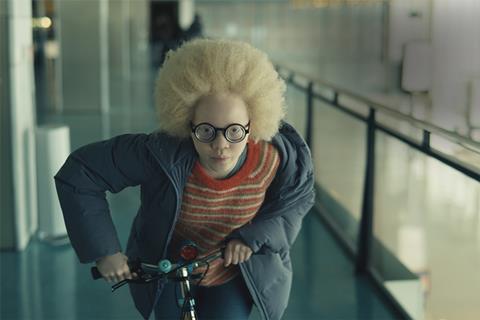
After her Sundance 2020 directorial debut Cuties, French-Senegalese filmmaker Maimouna Doucouré returns with Hawa, about a young albino girl living in Paris with her ailing grandmother who sets her sights on getting adopted by Michelle Obama, who happens to be visiting Paris on a promotional book tour.
Zangro produced through his production company Bien ou Bien Productions. Prime Video holds worldwide rights to the Platform selection, which gets its world premiere on September 14. There is a P&I screening at Scotiabank on September 9 at 4.10pm.
What made you want to tell this story?
First of all, I wanted to make a movie about dreams and about making our dreams come true. Today I’m a filmmaker, but for so many years I didn’t allow myself to train because I thought that the film world was not for people like me. When I decided to go [for it], doors started to open in front of me. But the biggest reason why I made this film is because when my daughter was born we found out she had special needs, so I began to think about how the world will look at her and I wanted to be able to give her everything that she needs. Even if something happens to me she will have enough faith and love to become the best version of herself.
You worked again with non-actors. Why do you like to do that?
Yes, exactly. The characters that I tell the stories about don’t really exist enough in French talent agencies [where there aren’t the right kind of actors who could portray them]. And I have to deal with that and adapt myself to that reality. So my challenge is to find them on the street or wherever I can. I have to shape them as actors in a short period of time. I try to make it like a big game for them.
Where did you find your lead, Sania Halifa?
We put out a casting call because I wanted to have someone extraordinary. It wasn’t easy to find an albino because, first of all, they are rare in France, and then we had to get their trust because they don’t see enough people interested in them. The casting call lasted about four or five months. We looked everywhere: in France and as well Switzerland, Belgium, even in Africa. Sania was in Paris.
What was it like training her to be an actor?
Sania is very different from the character. As you can see in the movie she has a very strong personality. In real life Sania has a high personality; she’s always smiling and laughing. I worked with her once a week at the start and at the end it was almost every day. We discussed how the character walks, talks, eats, everything. She was 16 when we shot. I didn’t give the character an age. I have my own idea and I like letting the audience decide.
Where and when did you shoot?
I filmed in Paris, where I live, in December last year and January of 2022. It lasted about 45 days. The last scene was in Senegal. It was just one day of shooting but it was important for me to have that reality.
Tell us about Oumou Sangaré, the Malian singer who plays Hawa’s grandmother. The character is a griot in the tradition of West African travelling singers and poets
She’s the most famous singer in Africa and has performed with Alicia Keys, Beyonce and many others. It was her first time [acting] and I thought about her when I wrote the story. I didn’t know how to get her. I found a contact and had been in Monaco where she lives and I met her there and asked her… I listened to her when I was a child. I was born in Paris and my family is from Senegal. My parents shared their culture and we’d hear griot singers at weddings and other ceremonies.
Are things changing for women in film?
First of all there is data which shows us the inequalities between men and women in French cinema in terms of opportunities like budgets allocated to a film or even in terms of salary. We can see there is a real political to make things move forward and measures like Collectif 50/50 [the French cinema gender equality movement created in the wake of #MeToo] have been put in place… I feel we still have a long way to go but we are on the right path.
You worked with Netflix on your first film and you’ve collaborated with Prime Video on Hawa. How did that come about?
I met Thomas Dubois [head of Originals, France] from Amazon Studios and we had the opportunity to make this movie right away with them. It was a really great experience. I was free to just make my film.
What did you learn from the controversy that erupted over the sexualised depiction of young girls in your first film, Cuties?
I stay true to myself and to my vision. I think it’s important to talk about social issues in cinema in order to change them. We all actually have the same fights and I like this expression in English - action speaks louder than words.
Have you met Michelle Obama?
I haven’t met her yet, but I will for sure.
What’s next?
I’m working on my next one for theatrical release. I’m writing that, but I can’t tell you more.

























No comments yet